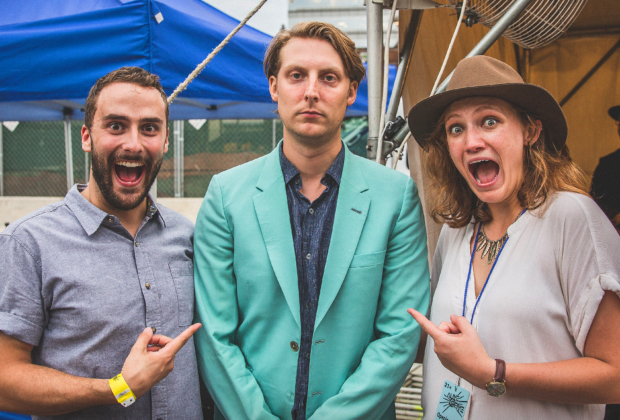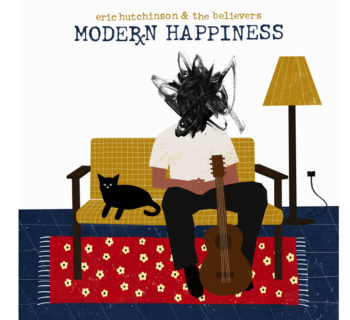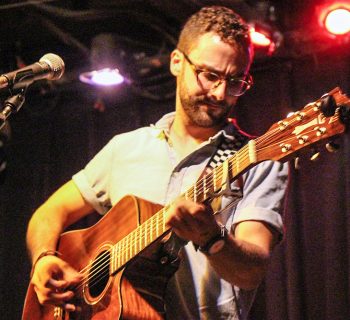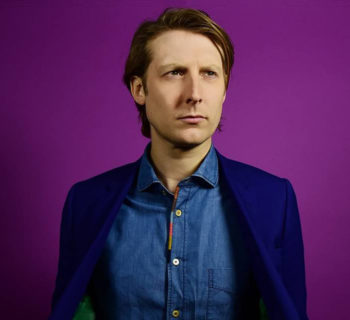- Known for percussive, melodic guitar work and introspective songwriting, Skout’s lyrics wrestle with the messy truths. Often writing and performing alongside her best friend and longtime collaborator Connor Gladney, Skout (Laura Valk) has created a sound that floats somewhere between indie, folk, and pop. The new album, Patterns, arrives Sept. 25. The lead single, “Move,” is out now.
- Eric Hutchinson is an international platinum-selling artist who recently released his latest album, Class of 98, a ‘90s alt-rock-inspired autobiographical record that chronicles the singer-songwriter’s adolescence. He has performed in all 50 states and has shared the stage with acts such as Jason Mraz, Amos Lee, Ingrid Michaelson, O.A.R. and Michael Franti. His single “Rock & Roll” earned him his first gold record in the United States and the song became a #1 hit in several countries.
Eric: How are you doing in this new reality with COVID?
Laura: It’s been one of the most challenging years of my life, as I’m sure it has been for everyone. My bandmate Connor is high risk, so he had no choice but to move out of NYC. It was a heartbreaking change. The mental ramifications have been huge too. Social isolation has forced us to find new ways to find joy.
Eric: For musicians in particular, I've been thinking a lot about just how magical that moment is when people come out on stage. They're creating something that wasn't there a minute ago. That's the thing I'm really missing right now.
Laura: Exactly. Without live music, it’s like the soul of the music industry has been put on hold. I’m releasing Patterns, my new EP in September, and all the tour planning we had been doing is just completely out the window. You had your Class of 98 tour totally stalled, right?
Eric: Yeah. We had a bunch of stuff scheduled and we pushed it back. And now it's kind of just, who knows? I mean, not knowing if I’ll tour at all, even in 2021. Work is definitely different now. How I express myself has changed. How has that change been for you?
Laura: While I’m really bummed not to release the EP with a celebratory tour, I’m trying to find the positives. I’m focusing all my energy on getting my music to the most ears possible digitally this year. I’m trying to be more present online; more honest and vulnerable than I have been in the past.
Eric: I sometimes wonder about how much to share of yourself with your audience. How do you strike that balance between being authentic and oversharing?
Laura: When I first started out, I was consciously holding back; my sexuality, mental health. As I started to re-evaluate, though, I asked myself why I was doing music in the first place. For me, it's a tangible place to put the things I can’t quite verbalize. So if I’m being my most authentic in my writing, why not let the person around my music represent a true version of myself as well? I think you paved the way for that mentality in me. I noticed a shift in your live show around your openness and vulnerability in the last few years.
Eric: I did a joke in my show where I asked, “How many people are on Prozac? Wellbutrin?” The amount of hands that were going up was surprising to me. Now, the more I do it, I find half the audience is on something to help deal with anxiety or depression. I've found it very empowering to shine a light on things that I have spent a lot of my life trying to keep in the dark. For me that was dealing with my family history and openly saying I was depressed.
Laura: You seem to have a way of staying uplifting while still addressing really serious topics.
Eric: It’s fun hearing you say that. I was so surprised when I first put out my first album Sounds Like This, because I felt like all these are all my depressing songs and they're all [about] my anxiety, and everyone’s like, “I love this happy album.” And I feel that with Patterns you’re not trying to sugar coat things. A lot of your music seems to be searching for answers. Do you feel as if you’ve answered any of your own earlier questions?
Laura: Oh man! I think I’ve come to the conclusion that I may never be the person with any answers or prescriptions in my songs. Just more questions.
Eric: You’ve said with “Move” that you didn’t realize the song was about depression until you heard it afterwards.
Laura: Yeah “Move” was heavy for me because after I demoed it, my girlfriend sat me down and said, “Is this how you feel? This is what depression sounds like.” I was in denial about being depressed because my life was functional. I had friends, a loving family, etc.
Eric: Right. Depression is perceived as “I don't get out of bed and I have a little grey cloud over me.” I think you really pulled off something with “Move.” As an artist, I feel like one of the hardest things to do is to fully be vulnerable in that way. I think it's a really important song. I related to it myself. A lot of people will. The song poses an interesting question of age and what age means to us and our art.
Laura: Yeah, I think we all have these age benchmarks that keep us moving, but at the end of the day, they’re probably not very healthy comparisons.
Eric: I always had in my head that Paul Simon wrote Graceland when he was 40. And I was like, well, that's an amazing album. And that was really late in his life. And so, there's still hope for me just to make it like the perfect album. Now I'm turning 40 in a few weeks. I'm in this weird position of, like, I'm not that young, but I'm not old enough. A person of just average age. That's not interesting. We need a hook! I had a lot of exposure, but I was still, like, twenty-seven, twenty-eight when that really started and I felt pretty old at that point. The benchmark stuff that you're talking about, I really ruined a lot of the enjoyment for myself during a lot of exciting times because I kept moving the goalposts.
Laura: From my end, I hope you know how much a musician of your caliber believing in me has changed my outlook and self-confidence. I’m so grateful for your friendship, mentorship, and advice.
Eric: It's purely just longer living, longer experience. There are no secrets to it. It's just doing it a little longer. I have a few more tips, but I still have tons of questions and things I don't understand.
Laura: We'll have to keep writing after those questions!
Pictured: Connor Gladney, Eric Hutchinson, Laura Valk (aka Skout)














